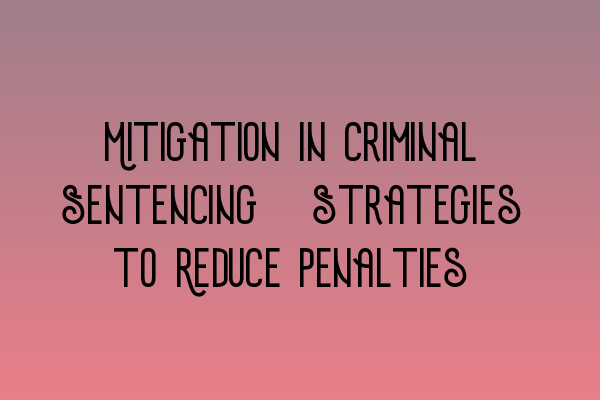Mitigation in Criminal Sentencing: Strategies to Reduce Penalties
When facing criminal charges, it is crucial to understand the concept of mitigation in criminal sentencing. Mitigation refers to the process of presenting evidence and arguments to the court with the aim of reducing the severity of the penalties imposed.
At SQE Criminal Law & Practice Law UK, we specialize in providing expert advice and representation in criminal cases, including devising effective mitigation strategies to secure the best possible outcome for our clients.
Before delving into the various strategies that can be employed in mitigation, it is important to bear in mind that each case is unique, and the approach taken should be tailored to the specific circumstances and facts of the case.
1. Personal Mitigation
Personal mitigation involves presenting evidence about the defendant’s character, background, and personal circumstances in order to humanize them in the eyes of the court. This can include factors such as their age, lack of previous convictions, community involvement, or any personal hardships they have faced.
By highlighting these aspects, the aim is to invoke empathy and understanding from the court, ultimately leading to a more lenient sentence. Our experienced criminal solicitors understand the importance of crafting a compelling personal mitigation case and can guide you through the process.
2. Circumstantial Mitigation
Circumstantial mitigation focuses on presenting evidence that aims to provide context and perspective to the defendant’s actions. This can include demonstrating that the defendant’s actions were out of character, provoked by unusual circumstances, or influenced by external factors beyond their control.
For example, if a defendant committed a crime under duress or as a result of severe financial hardship, this can be presented as mitigating circumstances to persuade the court to consider a more lenient sentence.
3. Cooperation
Cooperation with the authorities can often be a powerful mitigating factor. This involves actively assisting the police or prosecution in their investigation or providing information that can help resolve other criminal matters.
By demonstrating genuine remorse and a willingness to make amends, cooperation can significantly impact the sentencing decision. Our experienced solicitors can advise you on the best way to approach cooperation and how to present it effectively in court.
4. Rehabilitation and Restorative Justice
Another key strategy in mitigation is to emphasize the defendant’s commitment to rehabilitation and their willingness to engage in restorative justice processes. This can involve seeking therapy, attending educational programs, or expressing a desire to make amends to the victim or the community.
Highlighting these actions shows the court that the defendant is taking steps towards personal growth and reintegration into society, which can be influential in reducing the penalties imposed.
5. Legal Arguments and Sentencing Guidelines
Lastly, effective mitigation often involves skillfully presenting legal arguments and referencing relevant sentencing guidelines. This requires a thorough understanding of the law, as well as the ability to analyze the specific circumstances of the case in light of previous case law and statutory provisions.
At SQE Criminal Law & Practice Law UK, we stay up-to-date with the latest legal developments and have a deep understanding of sentencing guidelines. We can craft persuasive legal arguments that work in tandem with other mitigation strategies to achieve the best possible outcome for our clients.
In conclusion, mitigation in criminal sentencing is a complex and nuanced process that requires expertise and careful consideration. By employing the right mitigation strategies, you can increase the chances of reducing the penalties imposed. At SQE Criminal Law & Practice Law UK, our team of experienced solicitors is well-equipped to guide you through every stage of the mitigation process. Contact us today to discuss your case and ensure the best possible outcome.
Related Articles:
Demystifying the Solicitors Qualifying Examination Format
LLC Formation Made Simple: Step-by-Step Guide for UK Entrepreneurs
LLC Formation: A Step-by-Step Guide for UK Entrepreneurs
Business Regulations in the UK: A Comprehensive Overview
Ethical Considerations in UK Law: Upholding Professional Standards
